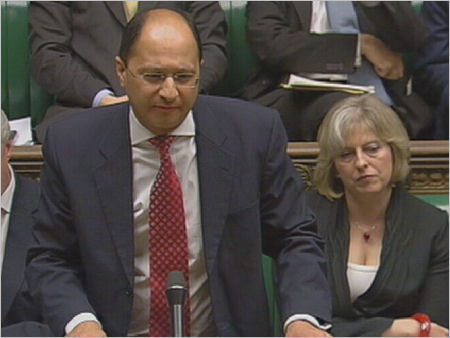Mr. Shailesh Vara (North-West Cambridgeshire) (Con): As we have heard, the motion updates the House of Commons Disqualification Act 1975, and we on this side of the House welcome it.
The 1975 Act basically clarifies who can stand for Parliament and who cannot. The proposed amendments are due mainly to the creation of new bodies and the renaming or merging of others, and to the scrapping of some offices and organisations. It is mainly a tidying-up exercise, but it is a considerable one and that is a reflection on the massive growth in the quango culture that has grown up since 1997. Given that there is a £10,000 de minimis threshold for some posts, it is very revealing to see the huge number of office holders who earn more than that per year-in many cases, a whole lot more.
There are about 230 amendments to schedule 1 of the 1975 Act. Although they do not affect the existing disqualification from the Commons of members of the civil service, armed forces, police and judiciary, they extend that disqualification to some 2,100 new office holders. The 400 or so coroners are now included, and disqualification will also cover office holders in bodies such as the Care Council for Wales, the Accounts Commission for Scotland, and the NHS Pay Review Body.
At the same time, the motion excludes members of about 500 other organisations that have been replaced or wound up. They include the Citizen's Charter Advisory Panel, which was wound up in 1997, the Cable Authority, which was dissolved in 1998, and the United Kingdom Ecolabelling Board, which was wound up in 1999 and had its functions taken over by the Food Standards Agency.
It is fair to say that this legislation is long overdue, as is clear from the dates that I have mentioned. Given that some of the posts have been out of date for a number of years, thought should perhaps have been given to updating the list a little earlier.
Incidentally, the House will be aware of the Conservative pledge to get rid of a large number of quangos if we are successful at the next general election. In that event, I can assure the House that there will be a rapid revision of this particular legislation to take account of the far fewer quangos that will exist after the election.
Mr. Greg Knight: On that point, does my hon. Friend agree that there is a case for going further than we are going today, and disqualifying all these people from being Members of the House of Lords?
Mr. Vara: My right hon. Friend makes a valid and serious point that will need to be considered. I very hope much that it will be, in due course.
It is also noteworthy that some of the additions to the list of excluded people are a consequence of the failure of previous legislation to make it clear that certain posts were properly covered by the disqualification provisions. For example, the Commissioner for Older People in Wales has been added to the list because an order under the Commissioner for Older People (Wales) Act 2006 was judged to be "ineffective". In like manner, the chairmen or other non-executive directors of NHS foundation trusts are being added to the list because an order relating to the Health and Social Care (Community Health and Standards) Act 2003 was thought to be "legally ineffective".
Of course it is good that these failings have been identified and are now being put right, but the House will note that they are a reflection on a Government who sought to bring in massive and huge amounts of legislation, rather than concentrating on the quality of that legislation. That being said, we on this side of the House support the motion.
| Hansard

